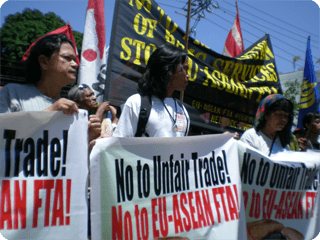EU still pursuing FTAs with Asean

The Malaysian Reserve - 12 May 2020
EU still pursuing FTAs with Asean
By Alifah Zainuddin
THE European Union (EU) continues to push for more trade deals with major Asean economies despite making slow progress following its consecutive successes with Singapore and Vietnam last year.
In outlining the EU’s immediate goals as the bloc celebrates 70 years of unity over the weekend, EU ambassador to Asean Igor Dreismans said it is important for Europe to continue its pursuit of region-to-region trade with Asean.
The EU’s free trade agreement (FTA) with Singapore came into effect in November last year, allowing Singapore to enjoy access to European digital markets, among others. Its trade agreement with Vietnam is also expected to be enforced soon which will see the gradual removal of all customs duties in 10 years. Singapore and Vietnam account for over 45% of total EU-Asean trade in 2018.
Talks with Indonesia, the Philippines and Thailand are in progress, but have proven to be difficult. Negotiations with Malaysia have stalled for years, with prevailing issues, particularly the EU’s plan to ban palm oil imports, taking precedence. The EU, however, is not giving up.
“FTAs are being negotiated with Indonesia and we hope to get a boost with Thailand, so that we have the building blocks to pursue an EU-Asean Agreement in the medium term. This will be good for our economies and societies,” Dreismans said at a virtual launch of the EU-Asean Blue Book Report 2020 last Friday.
Indonesia, the Philippines, Thailand and Malaysia collectively account for 50% of EU-Asean trade. The remaining four Asean members — Brunei, Cambodia, Laos and Myanmar — made up the rest.
The EU was Asean’s second- largest trading partner in 2018, after China, with total trade estimated at US$263 billion (RM1.14 billion). The EU was also the largest foreign investor in Asean, with about US$374 billion of foreign direct investment pumped into the region per annum in recent years.
Last month, the EU mobilised €350 million (RM1.66 billion) to mitigate the impacts of the coronavirus pandemic in the Asean region. The funds will support actions at country and regional levels to strengthen health systems, and alleviate the economic and social consequences of the pandemic.
Asean countries are among the worst hit in the world with Singapore recording the highest number of infections in the region with over 22,000 cases. Indonesia has the most deaths in the region with nearly 1,000 fatalities. To compare, Malaysia has 6,726 cases and 109 deaths (as at press time).
Apart from financial support, the EU is also looking to continuously share its input in areas such as data protection, tourism and the environment as the dust begins to settle on the outbreak.
Elaborating on the use of technology, Dreismans said: “We have seen how some of the tracing apps can protect lives. At the same time, there is concern on privacy. You don’t want your name to be circulated if you are Covid-19 positive. So, we need to find a way to combine both objectives.
“In Europe, we have tried to do so by issuing a European Commissioner recommendation on what member states could do in their legislation as well, to ensure that those mobile data are useful and at the same time protect privacy. We look forward to sharing our views and experience with Asean.”
The Regional Comprehensive Economic Partnership (RCEP), led by China, is also expected to conclude this year.
Singapore’s Trade and Industry Minister Chan Chun Sing last week said the deal was on track to be signed by year-end despite the Covid-19 pandemic.
The RCEP is set to be the world’s largest trade pact, involving all 10 Asean nations, as well as Australia, China, Japan, New Zealand and South Korea. India withdrew from the deal last year.





